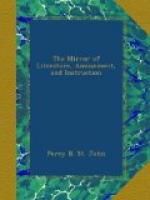The world was not his friend, nor the world’s law.
The deer with which the royal forests then abounded, afforded Robin and his companions an ample supply of food throughout the year. Their mode of life and domestic economy are more easily guessed at than described. Nevertheless, the poet has endeavoured to give us an outline in the following:
The merry pranks he play’d would
ask an age to tell,
And the adventures strange that Robin
Hood befel;
When Mansfield many a time for Robin hath
been laid,
How he hath cousen’d them, that
him would have betray’d:
An hundred valiant men had this brave
Robin Hood,
Still ready at his call, that bowmen were
right good,
And of these archers brave, there was
not any one
But he could kill a deer, his swiftest
speed upon,
Which they did boil and roast, in many
a mighty wood,
Sharp hunger, the fine sauce to their
more kingly food.
Then taking them to rest, his merry men
and he
Slept many a summer’s night under
the greenwood tree.
What oftentimes he took, he shar’d
amongst the poor,
From wealthy Abbot’s chests, and
churl’s abundant store,
He from the husband’s bed no married
woman wan,
But to his mistress dear, his loved Marian,
Was ever constant known, which wheresoe’er
she came
Was sovereign of the woods, chief lady
of the game;
Her clothes tuck’d to the knee,
and dainty braided hair,
With bow and quiver arm’d, she wander’d
here and there
Amongst the forests wild, Diana never
knew
Such pleasures, nor such harts as Mariana
slew.
Robin took away the goods of rich men only, never killing any person unless he was attacked: nor would he suffer a woman to be maltreated. Fordun, in the fourteenth century, calls him “that most celebrated robber;” and Major says, “I disapprove of the rapine of the man, but he was the most humane, and prince of all robbers.”
Robin Hood seems to have held bishops, abbots, priests, and monks, indeed all the clergy, in decided aversion; and this hostility was strongly impressed upon his men:
Thyse Byshoppes and thyse Archbyshoppes,
Ye shall them bete and bynde.
The abbot of St. Mary’s, York, from possessing so much wealth, appears to have met with Robin’s especial animosity: his yearly revenues amounted to L2,850. 1_s._ 5_d_. Robin was, however, a man of exemplary piety, according to the notions of that age, and retained a domestic chaplain, (friar Tuck,) no doubt, for the diurnal celebration of the divine mysteries. This we learn from an anecdote preserved by Fordun, “One day, as he heard mass, he was espied by a certain sheriff and officers belonging to the king, who had frequently before molested him. His people perceiving what was going forward, advised him to fly with all speed, but out of reverence of the Sacrament in which he was then engaged, he refused to do so. Most of his men fled, fearing death,




